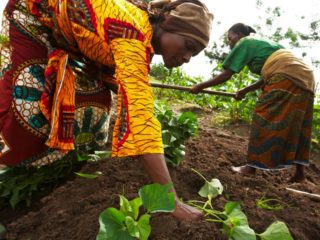Can farming ease Nigeria’s woes?
The United Nations Environment
Programme (UNEP) estimates that, between 1962 and 1968, Nigeria’s major foreign
exchange earner was the agricultural sector. Palm oil and groundnuts made up
around 47% of the country’s exports. However, Nigeria’s position as an
agricultural powerhouse has declined as oil gained prominence in Africa’s
largest economy.
“The oil sector represents 10% of
the gross domestic product (GDP) of Nigeria but accounts for 98% of the foreign
exchange earnings of the country and 80% of the revenues for the government,”
says the President of the African Development Bank (AfDB), Akinwumi Adesina.
Following the crash in crude oil
prices, agriculture is slowly emerging as a remedy for the economic woes of
Nigeria.
“We have to provide counter
cyclical reports. Nigeria is too big to fail. We will support Nigeria with a
$1-billion support program and a number of policy reforms that have to be done
to rejig the economy and we have coordinated with others on this. This is
actually a cheap source of financing, which will come with a 1.2% interest and
a 40-year moratorium, so this is the cheapest source of financing you can get,”
says Adesina.
The AfDB and other governmental
agencies are pulling together to attract young entrepreneurs to farming once
again. Rotimi Williams, a rice farmer, believes Nigerians need to be convinced
that agriculture is a viable path to relieve current economic woes.
Williams is the founder of
Kereksuk Rice Farms. He has 45,000 hectares of land in Tunga, local government
in Nasarawa State, close to Abuja.
“We are operating on 1,000
hectares which is expected to give us 8,000 tons of rice a year. I say expected
because ideally I should be doing two crops a year but because of floods, which
happen every September, I am only doing one crop. Government is yet to build
appropriate dams in the right places. We have no accessible roads, no
electricity and we have security issues, so all these things put together
limits what we can and cannot do in agriculture,” he says.
Williams is not the only one who
believes in shifting the way Nigerians think about farming.
“People first of all need to
believe in themselves. The ‘I can do’ spirit must come up in you or else you
will be wasting time. People must believe that once the passion is right,
nothing is impossible and this is their time to realize their greatness. So we
launched the Dakada campaign, which is entrenched into the main core values of
our people,” says the Governor of Akwa State, Udom Gabriel Emmanuel.
“Through this process, we
realized that a lot of the youth are interested in agriculture, so we said
‘fine, we are not going to give you money but we are going to give you all the
resources and facilities to do what you need to do’. So we try to provide not
just the environment but the input as well,” says Emmanuel.
According to Antti Ritvonen, CEO
and Country Manager at Dizengoff West Africa (Nigeria) Ltd, “The main reasons
why the youth are not farming are they have the wrong perception about farming,
lack of technical know-how, lack of precise technical support and inadequate
financial will power.”
Dizengoff claims to provide
opportunities to Nigerians looking to move into farming. “We provide
greenhouses that we deploy as a tool for empowering youth and women across
Nigeria. Since we started, our greenhouses have created employment for over 50
youths directly and over 700 people indirectly across the country, so
agriculture is certainly a driver of economic change and growth,” says
Ritvonen.
But they are not the only
international company investing in the agriculture sector in Nigeria. According
to Reuters, Old Mutual and Nigeria Sovereign Investment Authority (NSIA) joined
forces to raise $200 million to spend on agriculture projects in the country.
There is, however, a limitation
to how successful agriculture can become in Nigeria: land. According to the
Federal Ministry of Agriculture and Rural Development (FMARD), about 95% of
agricultural lands are not titled, effectively limiting their capacity to be
treated as collateral for finance.
“In most developing countries
that thrive in agriculture, like Thailand and India, the government gives them
funding… but on the books of the government they write those loans off. This
means they don’t expect the money back but they expect you to do a lot more
with the money they have given you. In Nigeria, the government expects you to
go to commercial banks to get funding and that is not going to fly because they
require collateral which any young entrepreneur would not have. You need to
create that enabling environment, which means land is easily accessible and the
resources are also available for them to be able to thrive in the business,”
says Williams.
As agriculture slowly becomes a
beacon of hope for job creation and revenue generation, the government will
need to spend more to help entrepreneurs get their hands dirty and grow.
Forbes




knowledgable information provided by you
ReplyDeleteAgricultural sprayers